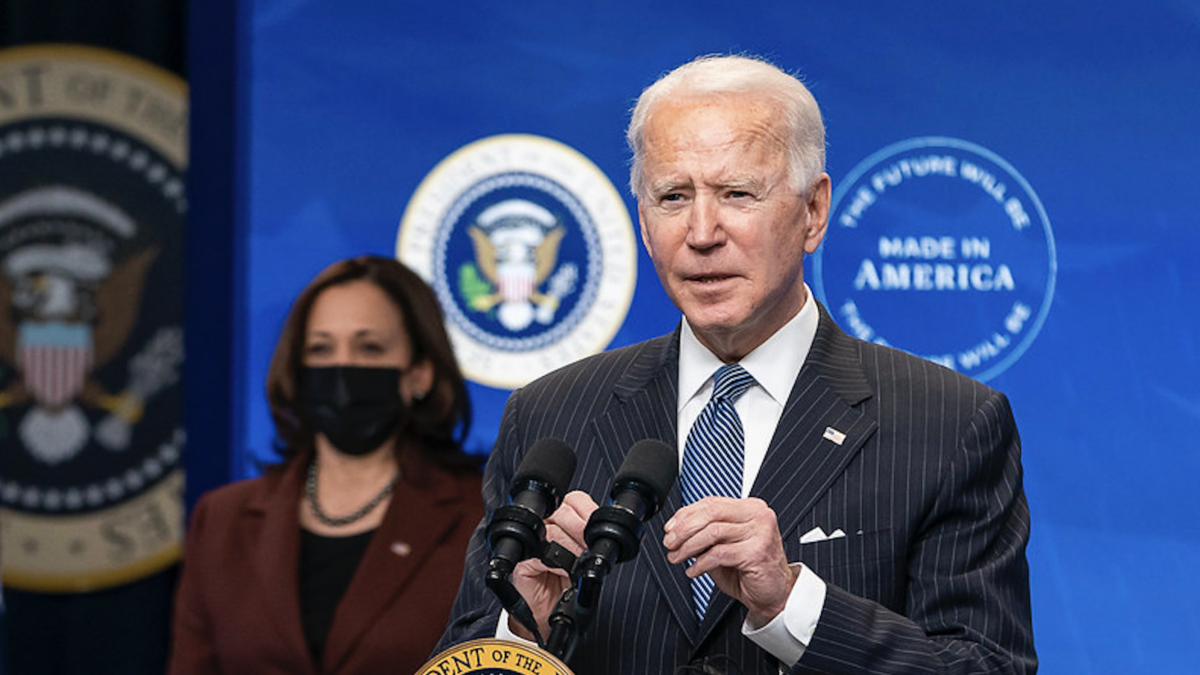Joe Biden has invoked the Defense Production Act to expedite the production of solar panels. Not only is the president’s decree a transparently illegal abuse of executive power, it promises to achieve the opposite of what the law intended.
The Defense Production Act gives the president authority “to prepare for and respond to military conflicts, natural or man-caused disasters, or acts of terrorism within the United States,” not the power to create industrial policy out of the ether that rewards his favored sector of the economy. Not even the most capricious or self-serving reading of the Defense Production Act could justify the idea that helping to build solar panel components is a response to a military conflict, a disaster, or an act of terrorism. If the Supreme Court stopped President Truman from interfering in the business of American steel mills at the height of the Korean War, as it did in Youngstown Sheet & Tube Company v. Sawyer, on what possible grounds could anyone believe that it’s the president’s bailiwick to unilaterally set solar panel policy during peacetime?
The administration has the gall to contend that it is governing by fiat because there are “threats to the availability of sufficient electricity generation capacity to meet expected customer demand.” Indeed, one of the biggest threats to affordable energy is the president. During the 2020 campaign Biden promised to use the framework of the Green New Deal to use 100 percent carbon-free electricity by 2035. On the first day of his presidency, Biden signed a slew of executive actions meant to inhibit fossil fuel production to meet that goal.
Biden could reverse those edicts today and help alleviate high gas prices. Rather than adjust to that reality, the administration — after begging OPEC and Venezuela to drill more — now argues that we are blessed with a perfect opportunity to “transition” away from affordable, efficient energy sources, and retrofit our power grids, homes, cars — our entire economy. Recall that the same people who assure us that completing the construction of a major gas pipeline from Canada would have absolutely no bearing on energy prices, now argue that overhauling our entire energy and transportation infrastructures will save you money.
The White House now claims that “clean energy technologies are a critical part of the arsenal we must harness to lower energy costs for families.” Now, even if a person has somehow convinced himself that solar panels are a vital part of our national defense, the notion that there is a pent-up organic demand for them is laughable. Without subsidies they would be prohibitively expensive for consumers. Even with subsidies, solar represents an inefficient sliver of our national portfolio.
Some Democrats have complained that the Biden administration’s pause on tariffs will only help Chinese panel makers, who dominate the market (using coal-fired power plants, cheap labor, and possibly slaves). They will simply move their product to the United States through Malaysia, Cambodia, and Vietnam. The administration’s Climate Czar John Kerry has argued that appeasing human-rights Chi-Coms is simply part of an effort to combat climate change. “Life,” he noted, “is always full of tough choices.” (Of course, if Kerry understood anything about tradeoffs, he wouldn’t be a Malthusian zealot.) Now, you may support protectionist policies vis-à-vis China — or maybe you don’t believe in tariffs at all — but nowhere does the Defense Production Act empower the president to alter or create new trade law.
On one hand, the president claims we’re enjoying the greatest economy in American history. On the other, he argues that he is compelled to tap emergency powers to save it. The Biden administration argues that its emergency intervention will help create “good-paying” “union” jobs, which has nothing to do with lowering energy prices. And if voters are interested in zeroing-out fossil fuels and “transitioning” to windmills and solar panels to the tune of tens of trillions of dollars, or creating a nation whose energy policy is reliant on unions, they should elect lawmakers who pass policies that make that happen.
The Defense Production Act, however, is a narrow Cold War-era act that empowers the president to intervene in private industry during genuine national security emergencies and shortages. It does not exist to allow an unpopular president to bypass Congress and act like an autocrat.









